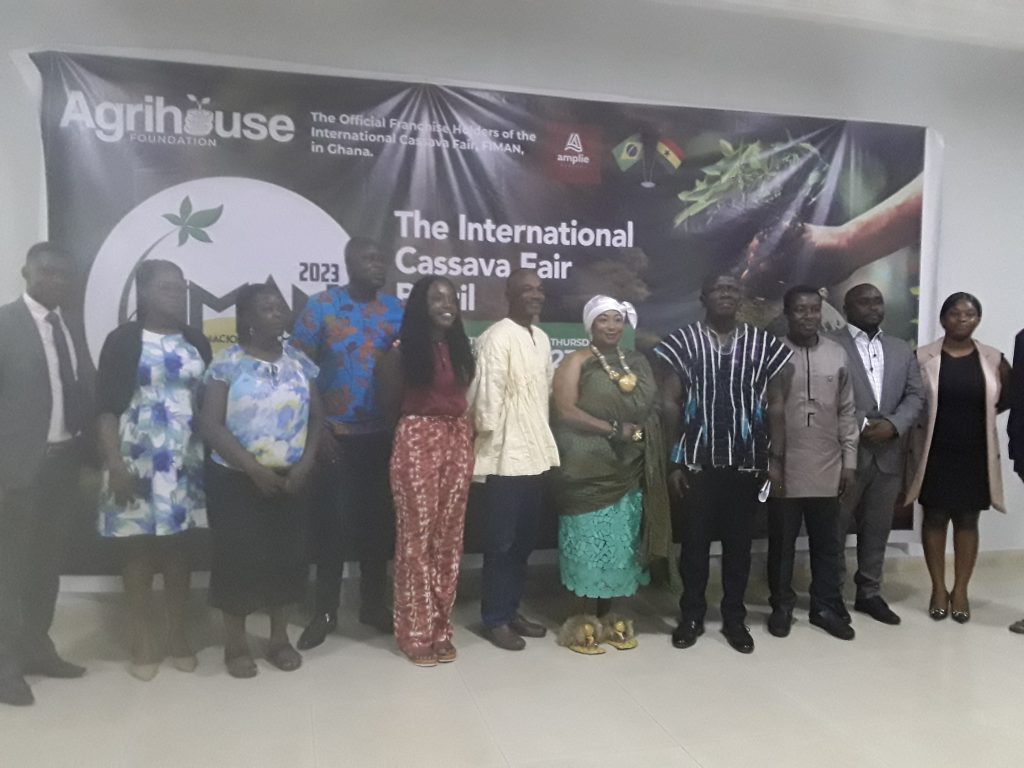Harriet Boateng Sarpong
Accra Oct 20, GNA – Ghanaians have been urged to embrace large scale cassava production to harness the untapped potential in industry.
Currently, the country produces over one million metric tonnes of edible cassava for domestic consumption instead of the industrialised type with high starch content needed to feed industry and for exports.
This came to light at the information session and the launch of the International Cassava Fair (FIMAN 2023) scheduled to take place from Tuesday, November 21 to Thursday, November 23, 2023, in Paranavaí, Brazil.
George Prah, Deputy Director of Agriculture overseeing Tubers, including cassava, at the Ministry of Food and Agriculture, stated the government’s commitment to promoting cassava sector industrialisation to address the gap, particularly considering Ghana’s predominant cultivation of edible cassava varieties.
“…Ghana, we are already self-sufficient in our cassava production. We produce more than we require and that is why the government is calling for the industrialisation of the cassava industry.
“We produce more of the edible type and for that matter we are not able to feed our industry with the industrialised starch so,
the government is urging producers to link up to partner with large-scale processors to streamline the production of essential industrial materials, fostering growth and efficiency within the industry.”

Mr Prah said the government, through Phase Two of the Planting for Food and Jobs Programme (PFJ 2), had designated farming enclaves across cassava-growing regions for the cultivation of industrialised cassava varieties.
“…There is a model that the Ministry is trying to run, farmers in cassava production, identified in these particular enclaves will be managed by aggregators, these aggregators will provide them with all the necessary mechanisation and extension services so it’s not just going to be farmers being left on their own to do their own production, they will be managed so that
they produce to meet the particular demand of these processing outfits.”
He said government through research had come out with about thirty-one varieties of the industrialised cassava types for cultivation by out growers.
“As it stands now there are several of them, we have about thirty-one varieties of the industrialised ones, I can mention Sika bankye, I can mention Cape Vas bankye, I can mention Tech bankye, I can mention Afisiafi, we have Esam bankye, we have Bankye Hemaa, there are a lot, they are all industrialised varieties.”
Agrihouse Foundation’s Executive Director, Alberta Nana Akyaa Akosa, urged cassava industry stakeholders to seize the opportunity and participate in the Fair, emphasising its potential to boost their
sector knowledge and access new opportunities.
“We are hoping to lead a strong delegation to Brazil, where it will not only be for the agri-tourism component, but also present the learning and information session that our industry can adopt to grow…”
William Dzamefe, the Regional Director of the Department of Agriculture in the Volta Region, said issues such as the land tenure system, limited mechanisation in cassava farming, and challenges in accessing global markets were hampering the cassava sector’s growth.
Eric Asamani Hudson, the Regional Director of the Department of Agriculture in Greater Accra Region, highlighted the
abundant opportunities within the cassava cultivation sector.
“We underestimated the gold in cassava and have not celebrated it enough, cassava can bring tourism, can be packaged as snack, used in sanitizers, tomato paste, biofuel for vehicles…”
Agrihouse Foundation and Podium Alimentos are joining forces to bolster the international cassava Fair’s significance and influence in Ghana, with a core mission of enhancing the cassava value chain sector.
GNA